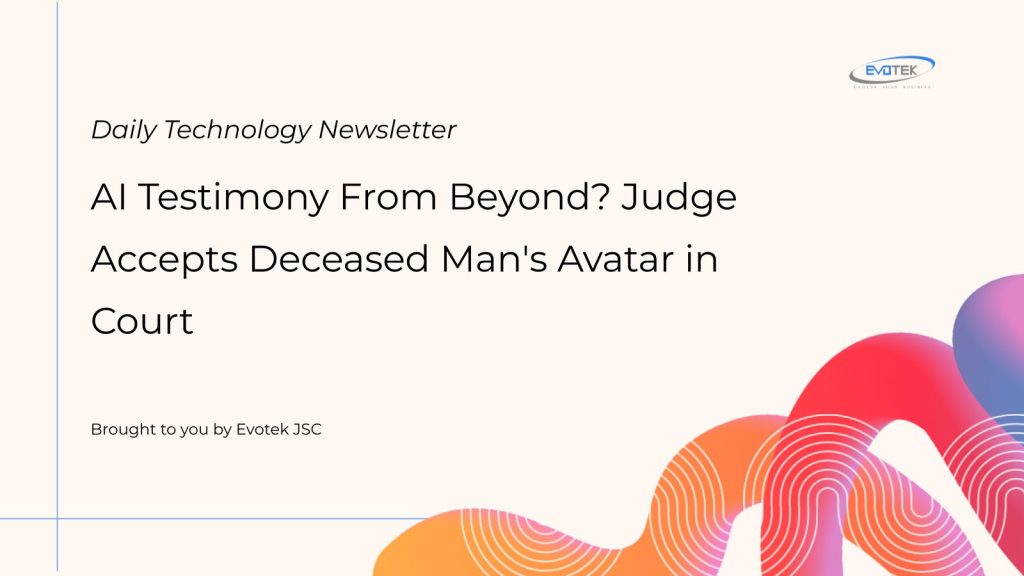In a landmark case raising ethical and technological questions, an Arizona court admitted AI-generated video testimony from a deceased victim during a sentencing hearing.
Christopher Pelkey, who tragically died in a 2021 road rage incident, was brought back to the courtroom in a virtual form thanks to his sister, Stacey Wales. Wales created an AI avatar of her brother to address his killer, Gabriel Horcasitas.
“To Gabriel Horcasitas, the man who shot me, it is a shame we encountered each other that day in those circumstances,” the AI Pelkey stated. “In another life we probably could have been friends. I believe in forgiveness and a God who forgives. I still do.”
This unprecedented event marks the first time an AI avatar of a deceased victim has been used in court, sparking debate about the future role of AI in legal proceedings.
Forgiveness From Beyond the Grave
Wales explained that the avatar project was initially met with resistance, even from her own family. Her husband expressed concerns, cautioning, “Stacey, you’re asking a lot.”
However, Wales was determined to give her brother a voice, even posthumously. The AI avatar stated, “Hello, just to be clear for everyone seeing this, I am a version of Chris Pelkey recreated through AI that uses my picture and my voice profile… Here is insight into who I actually was in real life.” The video transitioned to authentic footage of Pelkey discussing his life and faith before returning to the AI avatar.
The AI Pelkey addressed Horcasitas directly: “To Gabriel Horcasitas, the man who shot me, it is a shame we encountered each other that day in those circumstances…I believe in forgiveness, in God who forgives, I always have. And I still do.”
Judge Moved by AI’s Plea
Judge Todd Lang acknowledged being deeply moved by the AI video. He expressed appreciation for the message of forgiveness, noting, “I loved that AI…I heard the forgiveness, and I know Mr. Horcasitas could appreciate it, but so did I.”
Horcasitas’s lawyer also referenced the AI avatar in his plea for leniency, highlighting the AI’s statement that Pelkey and Horcasitas “could have been friends.”
Crafting the Digital Ghost
Wales revealed the painstaking process of creating the AI avatar. Her husband, Tim Wales, used Stable Diffusion fine-tuned with a Low-Rank Adaptation (LoRA) for the video and generative AI and deep learning for the voice clone.
Wales emphasized the importance of authenticity, stating, “It needs to be a blanket statement of love, because that’s what Chris would stand for. I can’t use it selfishly.”
Ethical Considerations
While the AI testimony was accepted without objection in this instance, the use of such technology raises significant ethical concerns. The AI avatar’s words were scripted by Pelkey’s sister, not generated by the deceased himself. This raises questions about the accuracy and potential manipulation of such “testimony.”
Jessica Gattuso, the victim’s rights attorney, defended the use of the AI, emphasizing transparency. “Stacey was up front and the video itself…said it was AI generated. We were very careful to make sure it was clear that these were the words that the family believed Christopher would have to say,” she explained. “At no point did anyone try to pass it off as Chris’ own words.”
The prosecution sought a nine-year sentence for Horcasitas, but Stacey Wales requested the maximum. The judge ultimately granted the maximum sentence of 10 and a half years, a decision Wales believes was influenced by the AI video.
“Our goal was to make the judge cry. Our goal was to bring Chris to life and to humanize him,” she concluded.
This case sets a precedent with potentially far-reaching implications for the future of AI in the courtroom. Whether AI can truly offer closure and justice, or if it risks manipulating emotions and distorting the truth, remains a subject of intense debate.

 日本語
日本語 한국어
한국어 Tiếng Việt
Tiếng Việt 简体中文
简体中文